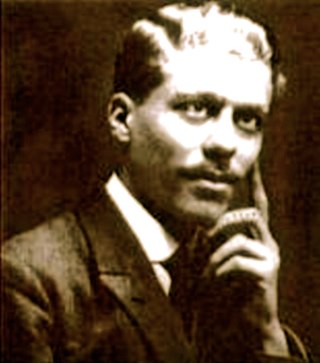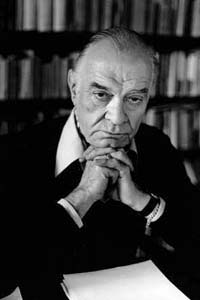Related Research Articles

Antoine de Rivarol was a Royalist French writer and translator who lived during the Revolutionary era. He was briefly married to the translator Louisa Henrietta de Rivarol.

Georges Valois was a French journalist and national syndicalist politician. He was a member of the French Resistance and died in the Bergen-Belsen concentration camp.

Emmanuel Mounier was a French philosopher, theologian, teacher and essayist.
Jean-Marie Domenach was a French writer and intellectual. He was noted as a left-wing and Catholic thinker.
Robert Aron (1898–1975) was a French historian and writer who wrote a number of books on politics and European history.

Michel Winock is a French historian, specializing in the history of the French Republic, intellectual movements, antisemitism, nationalism and the far right movements of France. He is a professeur des universités in contemporary history at the Institut d'Etudes Politiques de Paris (Sciences-Po) and member of L'Histoire magazine's editing board. Winock has also worked as a reporter for Le Monde.

Esprit is a French literary magazine. The magazine also deals with current events. It is based in Paris.

André Siegfried was a French academic, geographer and political writer best known to English speakers for his commentaries on American, Canadian, and British politics.

Denys Louis de Rougemont, known as Denis de Rougemont, was a Swiss writer and cultural theorist who wrote in French. One of the non-conformists of the 1930s, he addressed the perils of totalitarianism from a Christian point of view. After the Second World War, he promoted European federalism.
Raymond De Becker (1912–1969) was a Belgian journalist, writer, and intellectual. He became closely involved in Catholic and anti-parliamentarian politics in the interwar years and is notable as the editor of the daily newspaper Le Soir and a leading exponent of "intellectual collaboration" in German-occupied Belgium during World War II.
The Ordre Nouveau was a non-conformist political organization in the 1930s in France, created by Alexandre Marc and influenced by Robert Aron and Arnaud Dandieu's works. Some of its noted members included the future French leader Charles de Gaulle, Jean Coutrot, Charles Spinasse, and Henri Daniel-Rops.
Maurice Vaïsse is a French historian specialised in international relations and Defence. He is an editorial board member on Journal of Intelligence and Terrorism Studies.
Alexandre Marc, was a French writer and philosopher. He was the founder of personalist, federalist, communitarian thinking.
Joseph de La Porte, was an 18th-century French priest, literary critic, poet and playwright.
Robert Francis, pen name for Jean Godmé, (1909–1946) was a French writer, winner of the 1934 edition of the Prix Femina.

Pierre Andreu was a French journalist, essayist, biographer and poet.
Alexandra Laignel-Lavastine is a French philosopher, essayist, and historian of East European history and culture.

Jean d'Azémar de Fabrègues was a French Catholic intellectual and journalist. He was a "traditional" Catholic, rejecting the materialism of both liberal democracy and the totalitarian regimes of the right and the left.

Jacques Julliard is a French historian, columnist and essayist, and a former union leader. He is the author of numerous books.

Commentaire is a French quarterly magazine, created in 1978 by Raymond Aron and Jean-Claude Casanova.
References
- 1 2 Account of Jean-Louis Loubet del Bayle Archived 2006-11-23 at the Wayback Machine 's book in the Archives de Sciences Sociales des Religions n°118, on the EHESS website (in French)
- ↑ John Hellman (2002). Communitarian Third Way: Alexandre Marc and Ordre Nouveau, 1930-2000. McGill-Queen's Press - MQUP. p. 13. ISBN 978-0-7735-2376-0.
- ↑ Biographical notice of Jean Coutrot, Centre d'histoire de Sciences Po (in French)
- ↑ Prospectus de présentation de la revue "Esprit" Archived 2007-09-29 at the Wayback Machine , presented by Alain-Gérard Slama, on-line course of Sciences Po, 18 May 2007 (in French)
- ↑ Jean-Louis Loubet del Bayle, A 2001 Interview (p.3) in the Revue Jibrile(in French)
- 1 2 Jean-Louis Loubet del Bayle, A 2001 Interview (p.4) in the Revue Jibrile(in French)
- ↑ Jean-Louis Loubet del Bayle, A 2001 Interview (p.5) in the Revue Jibrile(in French)
- ↑ Jean-Louis Loubet del Bayle, A 2001 Interview (p.6) in the Revue Jibrile(in French)
- ↑ Antoine Guyader (preface by Pascal Ory), La Revue Idées— Des Non-Conformistes en Révolution Nationale, L'Harmattan, ISBN 2-296-01038-5 (in French)
- ↑ Janpier Dutrieux 2006 Personnaliste et fédéraliste, le monde d’Alexandre Marc (in French)